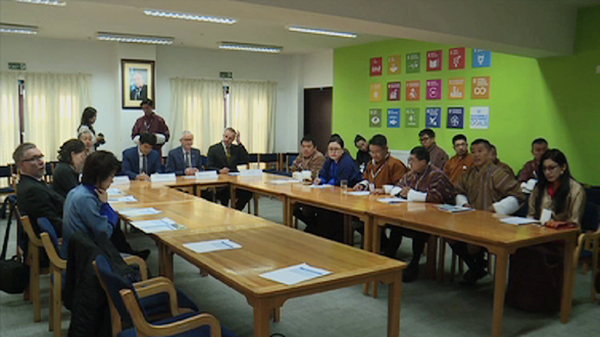 To assist the government in scaling-up the school feeding programme to a national school nutrition programme, the World Food Programme (WFP) country office signed a memorandum of understanding with the Korea International Cooperation Agency (KOICA). KOICA has agreed to contribute USD 4 M for this cause.
To assist the government in scaling-up the school feeding programme to a national school nutrition programme, the World Food Programme (WFP) country office signed a memorandum of understanding with the Korea International Cooperation Agency (KOICA). KOICA has agreed to contribute USD 4 M for this cause.
The primary objective of the project is to address malnutrition, obesity, and stunting among school children. The project, which will be implemented over a period of four years from 2019 to 2023, will work to improve school kitchen and store infrastructure and facilities. National food and dietary guidelines for school children will also be developed. The project will also improve the supply chain by reducing transport cost and provide safe and nutritious food, train the teachers and cooks.
“We are also working with the ministry of education and health in creating long term demand for local fresh and nutritious food. So we will be launching a very strategic behaviour change campaign for all school children aged 6 to 18 from early next year. We will first see what the kids are eating, whether they are 6, or 10 or 14, or 18 years old, in South, East and the West. And what are the barriers that trigger them to start eating more healthy and local foods,” said Svante Helms, the Head of the WFP Country Office.
The education, health and agriculture ministry and the WFP country office will be closely monitoring the project.
“We will be supporting the government’s agriculture programme and the school’s nutrition programme. For example, we will link 9,000 farmers to schools and we will help DMAC in the agriculture ministry to build the capacity of the farmers and to reduce the costs of the foods, that goes from the farmers to the schools. We will be using a digital monitoring system at school levels that look at health and nutrition indicators for all schools across the country,” said the WFP Country office’s head Svante.
The implementation of the project is expected to enhance the quality of education by ensuring that schools have the required infrastructure to implement the school nutrition programme with improved school meals and integrated nutrition and health education.
Phub Gyem












